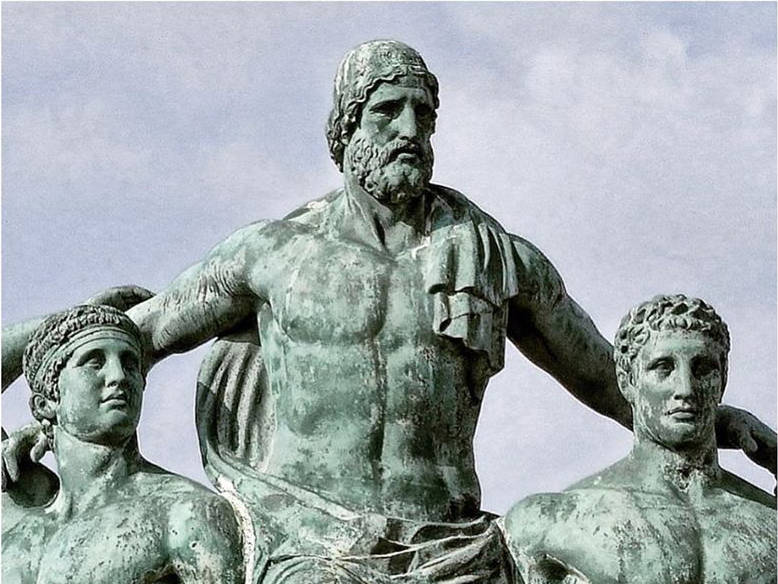Discovering boxing's first ever champions
A thrilling journey back in time to learn about the greatest fighters from the early Olympic Games and the crucial developments in boxing through the ages
Early greats of the Games
Boxing took place at the Ancient Olympic Games in Greece for the first time in 688 BC (the 23rd edition of the event) and the maiden competition was won by Onomastos of Smyrna, who went on to work on the rules of the sport. His homeland of Smyrna was located on the western coast of Anatolia, which was part of the Greek Ionian community.
One of the youngest winners of the Ancient boxing events was Pythagoras of Samos, who claimed the coveted title in the 48th Olympiad. He trained for 16 months for the Games and, although excluded from the young boys’ competition, won substantial consolation by winning the men’s title in 588 BC.
Another notable name was Glaucus of Carystus, who earned one Ancient Olympic title, two Pythian, eight Nemean, and eight Isthmian Games boxing crowns during the sixth century BC.
Glaucus was seriously injured by an opponent before the final fight of the Olympic Games but his father persuaded him not to withdraw from the title contest. An inspired Glaucus duly defeated his final foe with a telling blow to become an Olympic king. The story of Glaucus’ extraordinary life and career was documented by Greek traveller and geographer Pausanias in the second century BC.
Controversy was common in early boxing. Kleomedes of Astypalaia was a successful fighter in the early fifth century BC and won the Olympic Games in either 496 or in 492 BC. However, Kleomedes killed his final opponent Ikkos using illegal tactics and the judges – known as hellanodikai – stripped him of his Olympic victory.
The island of Thasos had its combat hero in Theagenes of Thasos, who won the boxing title in 480 BC and added another one in pankration (a combination of wrestling and boxing) in 476 BC. He was unbeaten in the boxing discipline for a staggering 22 years and according to ancient sources won around 1300 or 1400 bouts during a long and successful career.
The most decorated Ancient Olympic Games athlete in the fifth century BC was Diagoras of Rhodes. Diagoras won the boxing tournament of the 79th Olympiad in 464 BC and seven other events – including the Pythian Games, the Isthmian Games and the Nemean Games. Diagoras’ tomb was discovered by archaeologists near to Marmaris in 2018 and he has a modern statue in Rhodes City.
Kleitomachos of Thebes competed in boxing, in wrestling and also in pankration and won boxing Olympic titles in 216 and 212; the 140th and 141st Olympiads respectively. Remarkably, Kleitomachos won the boxing, wrestling, and the pankration titles at the Isthmian Games all on the same day! This impressive achievement, triumph in all of three combat events within one day at the Isthmian Games, was only ever emulated by the aforementioned Theagenes of Thasos. Roman author Claudius Aelianus provided a historical source about Kleitomachos’ life and successes more than 400 years later.
Boxing and the Roman Empire
Boxing was known as pugilatus in the Latin-speaking Roman Empire and was perhaps even more brutal than in ancient Greece; with more fatalities during competition. ‘Pugilism’ is one of the modern English words for boxing and originates from the Roman Empire and the current Italian name for the sport remains pugilato; also from the old Latin.
Boxing continued in the Ancient Olympic Games during the Roman period and it was part of both gladiatorial contests and military training until at least 400 AD. The boxers used the so-called equipment of caestus; leather knuckle-dusters and a combination of inserted metal elements to cause maximum damage on the faces of foes during fights. The caestus was a real weapon and given its design to open wounds, many bouts ended in the death of the loser.
Athens of course became part of the Roman Empire and the last piece of historical evidence from the Ancient Olympic Games documents the city’s famous warrior Aurelios Zopyros winning the junior boxing competition in 385 AD.
Theodosius the Great was a powerful Roman Emperor from 379 until 395 AD – ruling over both Eastern and Western parts of the Empire – and he banned the Ancient Olympic Games in 393; suspending the development of boxing in the process.
Boxing after the Roman Empire
Following the fall of the Western Roman Empire, written sources do not mention boxing in the second part of the first millennium AD. There is evidence of boxing returning in various countries during the Middle Ages between the 12th and 17th centuries. The major Italian cities led Europe in the 13th, 14th and 15th centuries and organised fist-fighting existed in many of these states and cities. Traditional bare-knuckle boxing was a combat sport in the ancient Rus during this time and was called Kulachniy Boy in Russian.
The sport was re-invented in the 16th century in England and, following that, the country became the pioneers of modern boxing. England became the most powerful nation in the world from the 17th century and the centre for many new developments. Bare-knuckle boxing also became known as prize fighting and was increasingly popular in England from the 16th centuries – but the real development came from the first official bout which would take place in 1681.
The first documented "boxing match" took place in in Britian when the Duke of Albemarle engineered a bout between his butler and his butcher. In the coming years, bare-knuckle boxing contests would be held in ampitheatres all over England.
Many boxers still chose to fight with bare knuckles until 1867 when gloves were mandated by the Marquess of Queensberry Rules. And that momentous occasion is considered the birth of modern boxing, and a whole other history altogether.
HÖRFA are proud sponsors of British Boxing News

